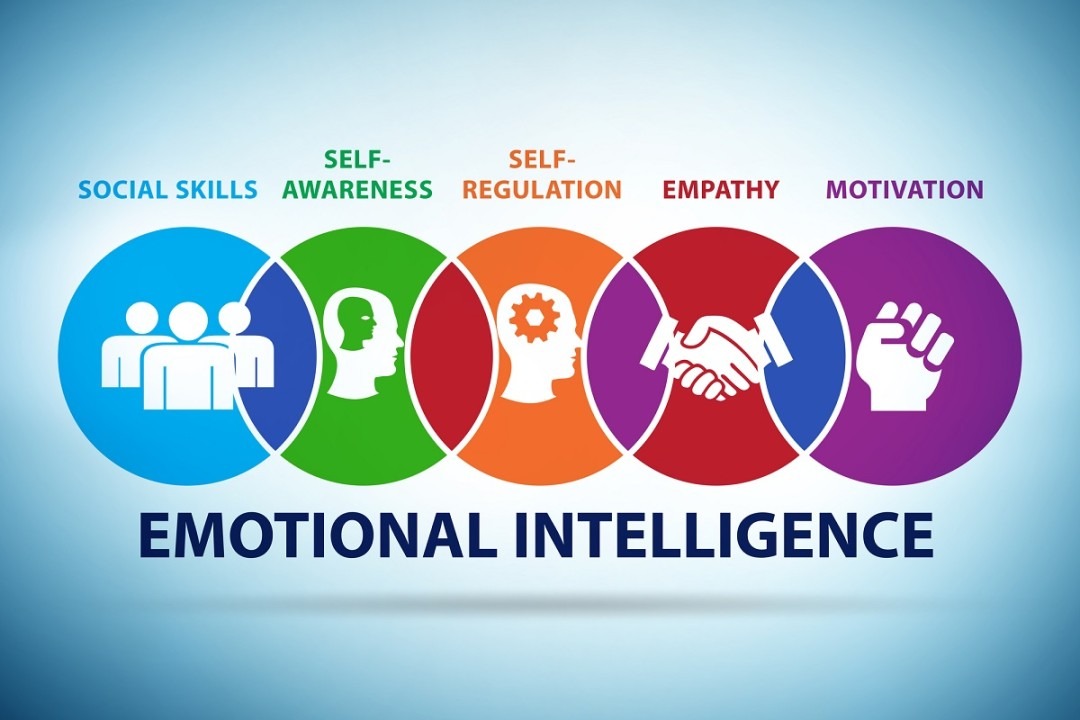In today’s fast-paced and interconnected world, the ability to understand and manage emotions is becoming increasingly important. Emotional intelligence (EI) is a critical skill that influences how we interact with others, manage stress, and make decisions. This blog post will delve into the concept of emotional intelligence, its components, its significance, and how it can be developed.
What is Emotional Intelligence?
Emotional intelligence, often abbreviated as EI or EQ (Emotional Quotient), refers to the ability to recognize, understand, and manage our own emotions, as well as the emotions of others. It was popularized by psychologist Daniel Goleman, who outlined five key components of EI:
- Self-awareness: Recognizing and understanding your own emotions.
- Self-regulation: Managing or redirecting your emotions in a healthy way.
- Motivation: Using emotions to stay focused and driven towards goals.
- Empathy: Understanding and sharing the feelings of others.
- Social skills: Managing relationships and building networks.
The Importance of Emotional Intelligence
Emotional intelligence plays a crucial role in various aspects of life:
1. Personal Relationships
High EI helps in fostering healthy and meaningful relationships. Understanding and managing your own emotions can lead to better communication and conflict resolution. Empathy, a key component of EI, allows for deeper connections and more compassionate interactions.
2. Workplace Success
In the workplace, EI is linked to better teamwork, leadership, and job performance. Leaders with high EI can inspire and motivate their teams, navigate the complexities of human dynamics, and create a positive work environment.
3. Mental Health
Emotional intelligence contributes to mental well-being. It helps in managing stress, anxiety, and depression by promoting healthy emotional responses and coping mechanisms.
4. Decision Making
High EI individuals are better at making decisions because they can understand and manage their emotions, leading to more rational and less impulsive choices.
Components of Emotional Intelligence
Let’s explore each component of emotional intelligence in detail:
1. Self-awareness
Self-awareness is the ability to recognize and understand your own emotions, triggers, and how they affect your thoughts and behavior. It involves:
- Emotional awareness: Recognizing your own emotions and how they affect your performance.
- Accurate self-assessment: Knowing your strengths and weaknesses.
- Self-confidence: A strong sense of your self-worth and capabilities.
2. Self-regulation
Self-regulation is about managing your emotions in healthy ways, ensuring that your emotional reactions are appropriate for the situation. This includes:
- Self-control: Managing disruptive emotions and impulses.
- Trustworthiness: Maintaining honesty and integrity.
- Conscientiousness: Taking responsibility for your own performance.
- Adaptability: Flexibility in handling change.
- Innovativeness: Being open to new ideas and approaches.
3. Motivation
Motivation within EI refers to the inner drive to achieve goals, often for reasons beyond external rewards such as money or status. Key aspects include:
- Achievement drive: Striving to improve or meet a standard of excellence.
- Commitment: Aligning with the goals of the group or organization.
- Initiative: Readiness to act on opportunities.
- Optimism: Persistence in pursuing goals despite obstacles and setbacks.
4. Empathy
Empathy is the ability to understand and share the feelings of others. It involves:
- Understanding others: Sensing others’ feelings and perspectives, and taking an active interest in their concerns.
- Developing others: Sensing what others need to progress and bolstering their abilities.
- Service orientation: Anticipating, recognizing, and meeting customers’ needs.
- Leveraging diversity: Cultivating opportunities through diverse people.
- Political awareness: Reading a group’s emotional currents and power relationships.
5. Social Skills
Social skills are the abilities to manage relationships to move people in desired directions. This includes:
- Influence: Wielding effective tactics for persuasion.
- Communication: Listening openly and sending convincing messages.
- Conflict management: Negotiating and resolving disagreements.
- Leadership: Inspiring and guiding individuals and groups.
- Change catalyst: Initiating or managing change.
- Building bonds: Nurturing instrumental relationships.
- Collaboration and cooperation: Working with others toward shared goals.
- Team capabilities: Creating group synergy in pursuing collective goals.
Developing Emotional Intelligence
Emotional intelligence is not a fixed trait; it can be developed and enhanced over time through practice and awareness. Here are some strategies:
1. Self-Reflection
Regularly take time to reflect on your emotions and behaviors. Journaling can help track your emotional responses and identify patterns or triggers.
2. Mindfulness Practices
Mindfulness and meditation can enhance self-awareness and self-regulation by helping you stay present and aware of your emotions.
3. Feedback
Seek feedback from others about your emotional interactions. This can provide valuable insights into how your emotions affect those around you.
4. Empathy Exercises
Practice putting yourself in others’ shoes. Try to understand their perspectives and emotions, which can enhance your empathy.
5. Communication Skills
Work on your communication skills by actively listening, being open to feedback, and expressing your thoughts clearly and respectfully.
6. Stress Management
Develop healthy coping mechanisms for stress, such as exercise, hobbies, or talking to a friend, to maintain emotional balance.
Conclusion
Emotional intelligence is a vital skill that impacts all areas of life, from personal relationships to professional success and mental health. By understanding and developing the components of emotional intelligence—self-awareness, self-regulation, motivation, empathy, and social skills—you can improve your interactions, make better decisions, and lead a more fulfilling life. Embracing emotional intelligence is a journey, one that can lead to greater self-understanding and stronger connections with those around you.

